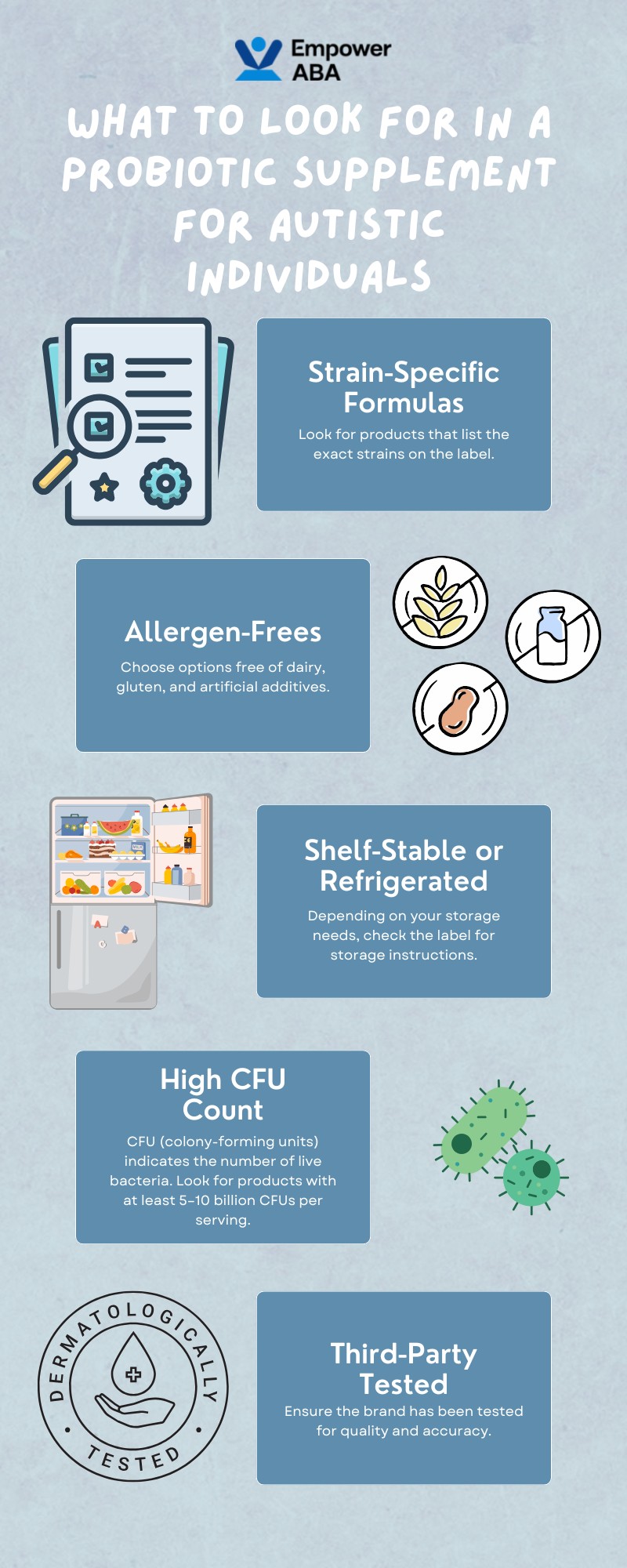Key Points:
- Certain probiotic strains have shown potential benefits for children with autism, particularly in supporting gut health and behavior.
- Specific probiotics like Lactobacillus rhamnosus and Bifidobacterium longum are often considered among the best probiotics for autism due to their effects on gut-brain communication.
- A balanced gut microbiome may help improve digestion, mood, and even social behaviors in children with autism.
When parenting a child with autism, it’s natural to seek out every option that could support their well-being—especially ones that feel gentle, natural, and manageable at home. Questions often come up about diet, supplements, and how gut health may tie into behavior and development. One common query is, “Which probiotics are best for autism?”
The answer is layered, but the science increasingly suggests a fascinating connection between gut health and autism spectrum disorder (ASD). Below, we’ll walk through the current understanding of this gut-brain connection, highlight which probiotic strains are most studied for autism, and help parents make informed decisions with empathy, clarity, and hope.
Can Probiotics Really Help with Autism?
Yes, probiotics may offer supportive benefits for some children with autism. While they aren’t a cure, probiotics can improve gut health, which is often linked to behavioral and emotional symptoms in children with autism.
Understanding the Gut-Brain Connection in Autism
It’s no longer just a theory—scientific research has backed up the idea that the gut and brain are deeply connected. This connection is often called the gut-brain axis, and it plays a vital role in overall emotional and neurological health.
The gut produces many of the same neurotransmitters that the brain does, such as serotonin and dopamine. When the gut is out of balance, it can send stress signals to the brain, leading to behavioral challenges. Children with autism who have chronic digestive issues may be experiencing exactly that—a disrupted gut-brain dialogue.
Improving gut health through diet, probiotics, and other interventions can lead to observable changes in a child’s behavior and comfort.
Which Probiotics are Best for Autism?
There are a handful of probiotic strains that stand out in autism-related research. These strains are known for supporting digestion, reducing inflammation, and enhancing brain function through microbiome balance.
Here are some of the best-researched strains to look for:
1. Lactobacillus rhamnosus GG
This powerful strain is known for its ability to reduce anxiety-like behaviors and improve gut barrier function. In studies involving children, it has been linked to better digestion and mood regulation.
2. Bifidobacterium longum
A favorite for managing stress responses and supporting immune function, this strain has shown promise in enhancing communication between the gut and the brain.
3. Lactobacillus plantarum
This strain helps reduce bloating and gas and is also being studied for its potential in easing irritability and hyperactivity in children with autism.
4. Bifidobacterium infantis
Often used in infant formulas, this strain helps reduce inflammation and promotes the growth of other good bacteria—making it a helpful addition for young children on the spectrum.
5. Saccharomyces boulardii
Although technically a yeast, this probiotic helps manage harmful bacteria and is frequently used to treat diarrhea and imbalanced gut flora.
Each child is unique, so not every strain will work for every child. Consulting with a pediatrician or nutritionist familiar with autism is a good way to start.
5 Benefits of Probiotics for Children with Autism
Parents often want to know what kind of improvements they can expect. While probiotics are not a one-size-fits-all solution, many families report noticeable positive changes.
Here are some of the most commonly observed benefits:
Improved Digestion
Children with autism frequently suffer from digestive issues. Probiotics help restore the natural balance of bacteria in the gut, making digestion smoother and less painful.
Better Mood Regulation
A healthy gut may help regulate serotonin and other brain chemicals linked to mood. Some parents see fewer meltdowns and more emotional stability after consistent probiotic use.
Enhanced Sleep Patterns
Probiotics can support better absorption of nutrients and a calmer gut, which contributes to improved sleep quality—a big win for both children and parents.
Reduced Behavioral Issues
While evidence is still developing, early research and anecdotal feedback suggest probiotics may help with focus, hyperactivity, and even social engagement.
Stronger Immune System
By boosting good bacteria, probiotics also help protect against common illnesses, which can be especially helpful for children who are sensitive to routine changes or doctor visits.
What to Look for in a Probiotic Supplement for Autistic Individuals
Choosing a probiotic for a child with autism can feel overwhelming. Here are some key features to consider:

Talk to your child’s healthcare provider before starting any supplement to make sure it’s safe and appropriate for their needs.
Are Probiotics Safe for Kids with Autism?
Generally, yes. Probiotics are considered safe for most children, including those with autism. However, it’s crucial to introduce them slowly and observe any changes. Occasionally, mild bloating or gas may occur initially as the gut adjusts.
If your child has a weakened immune system or is on medications, be sure to consult a healthcare professional before starting probiotics. For autistic adults looking to support overall wellness through diet and supplements, you might also find our article A Nutritional Guide to Supplements for Adults With Autism helpful.
Support Beyond Supplements: The Role of ABA Therapy
While probiotics support the body from the inside out, structured therapies like ABA (Applied Behavior Analysis) help build skills and improve behaviors through evidence-based techniques.
If you’re looking for additional support beyond nutrition and supplements, Empower ABA offers compassionate and personalized ABA therapy in New York, New Jersey, and Virginia. Our dedicated therapists help children with autism develop essential communication, social, and life skills through tailored one-on-one sessions.
Get in touch today to learn more about how ABA therapy can complement your child’s growth journey.

